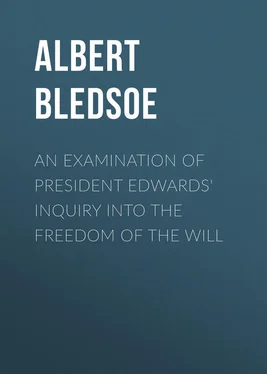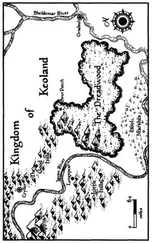Albert Bledsoe - An Examination of President Edwards' Inquiry into the Freedom of the Will
Здесь есть возможность читать онлайн «Albert Bledsoe - An Examination of President Edwards' Inquiry into the Freedom of the Will» — ознакомительный отрывок электронной книги совершенно бесплатно, а после прочтения отрывка купить полную версию. В некоторых случаях можно слушать аудио, скачать через торрент в формате fb2 и присутствует краткое содержание. ISBN: , Издательство: Иностранный паблик, Жанр: foreign_antique, foreign_prose, на английском языке. Описание произведения, (предисловие) а так же отзывы посетителей доступны на портале библиотеки ЛибКат.
- Название:An Examination of President Edwards' Inquiry into the Freedom of the Will
- Автор:
- Издательство:Иностранный паблик
- Жанр:
- Год:неизвестен
- ISBN:http://www.gutenberg.org/ebooks/35839
- Рейтинг книги:4 / 5. Голосов: 1
-
Избранное:Добавить в избранное
- Отзывы:
-
Ваша оценка:
- 80
- 1
- 2
- 3
- 4
- 5
An Examination of President Edwards' Inquiry into the Freedom of the Will: краткое содержание, описание и аннотация
Предлагаем к чтению аннотацию, описание, краткое содержание или предисловие (зависит от того, что написал сам автор книги «An Examination of President Edwards' Inquiry into the Freedom of the Will»). Если вы не нашли необходимую информацию о книге — напишите в комментариях, мы постараемся отыскать её.
An Examination of President Edwards' Inquiry into the Freedom of the Will — читать онлайн ознакомительный отрывок
Ниже представлен текст книги, разбитый по страницам. Система сохранения места последней прочитанной страницы, позволяет с удобством читать онлайн бесплатно книгу «An Examination of President Edwards' Inquiry into the Freedom of the Will», без необходимости каждый раз заново искать на чём Вы остановились. Поставьте закладку, и сможете в любой момент перейти на страницу, на которой закончили чтение.
Интервал:
Закладка:
Again. President Edwards has written a section to prove, that “volitions are necessarily connected with the influence of motives;” which clearly implies that they are brought to pass by the influence of motives. In this section, he says, “Motives do nothing, as motives or inducements, but by their influence. And so much as is done by their influence is the effect of them. For that is the notion of an effect, something that is brought to pass by the influence of something else.” Here motives are said to be the causes of volitions, and to bring them to pass by their influence . Is this to make motive merely the condition on which the mind acts? Is this to consider it as merely an antecedent to volition, which exerts no influence? On the contrary, does it not strongly remind one of that “restrained sense of the word cause,” in which it signifies, that which “has an influence to produce a thing, or bring it to pass? ”
Once more. In relation to the acts of the will, he adopts the following language to show that they are necessarily dependent on the influence of motives: “For an event to have a cause and ground of its existence, and yet not be connected with its cause, is an inconsistency. For if the event be not connected with the cause, it is not dependent on its cause; its existence is as it were loose from its influence ; and it may attend it, or it may not; its being a mere contingency, whether it follows or attends the influence of the cause, or not; and that is the same thing as not to be dependent on it. And to say the event is not dependent on its cause, is absurd ; it is the same thing as to say, it is not its cause, nor the event the effect of it; for dependence on the influence of a cause is the very notion of an effect . If there be no such relation between one thing and another, consisting in the connexion and dependence of one thing on the influence of another, then it is certain there is no such relation between them as is signified by the relation of cause and effect,” p. 77-8. Now, here we are told, that it is the very notion of an effect, that it owes its existence to the influence of its cause; and that it is absurd to speak of an effect which is loose from the influence of its cause. It is this influence, “which causes volition to arise and come forth into existence.” Any other notion of cause and effect is absurd and unmeaning. And yet, President Edwards informs us, that he sometimes uses the term cause to signify any antecedent, though it may exert no influence; and that he so employs it, in order to prevent cavilling and objecting. Now, what is all this taken together, but to inform us, that he sometimes uses the word in question very absurdly , in order to keep us from finding fault with him? The truth is, that whatever apparent concession President Edwards may have made, he does habitually bring down the term cause to its narrow and restrained sense, to its strict and proper meaning, when he says, that motive is the cause of volition. He loses sight entirely of the idea, that it is only the occasion on which the mind acts.
I might multiply extracts to the same effect almost without end; but it is not necessary. It must be evident to every impartial reader of the Inquiry, that even if the author really meant by the above extracts, that motive is merely the antecedent to volition; this was only a momentary concession made to his opponents, with the vague and ill-defined hope, perhaps, that it would render his system less obnoxious to them. It had no abiding place in his mind. It was no sooner uttered than it was repelled and driven away by the whole tenor of his system. We soon hear him, as if no such thing had ever been dreamed of in his philosophy, asking the question, and that too, in relation to motives, “What can be meant by a cause , but something that is the ground and reason of a thing by its influence , an influence that is prevalent and effectual,” p. 97. Will it be pretended, that this does not come up to his definition of an efficient cause, as that which brings something to pass by “a positive influence?” Such a pretext would amount to nothing; for Edwards has said, that “motives excite volition;” and “to excite, is to be a cause in the most proper sense, not merely a negative occasion, but a ground of existence by positive influence, ” p. 96.
An efficient cause is properly defined by the Edwardses themselves. “Does not the man talk absurdly and inconsistently,” says the younger Edwards, “who asserts, that a man is the efficient cause of his own volitions, yet puts forth no exertion in order to cause it? If any other way of efficiently causing an effect, be possible or conceivable, let it be pointed out,” p.49. President Edwards evidently entertained the same idea; for he repeatedly says, that if the mind be the cause of its own volitions, it must cause them by a preceding act of the mind. The objection which he urges against the self-determining power, is founded on this idea of a cause. It is what he means, when he says, that the term cause is “often used in so restrained a sense as to signify only that which has a positive efficiency or influence to produce a thing, or bring it to pass .”
That President Edwards regarded motive as the efficient or producing cause of volition, according to his own notion of it, is clear not only from numerous passages of the Inquiry; it is also wrought into the very substance and structure of his whole argument. It is involved in his very definition of the strongest motive. The strongest motive, says he, is the whole of that which “ operates to induce a particular choice.” Now, to say that one thing operates to induce another, or bring it into existence, is, according to the definition of the younger Edwards himself, to say that it is the efficient cause of the thing so produced. If there be any meaning in words, or any truth in the definition of the Edwardses, then to say that one thing operates to produce another, is to say that it is its efficient cause. President Edwards, as we have seen, holds that motive is “the effectual power and efficacy” which produces volition.
Again. Edwards frequently says, that “if this great principle of common sense, that every effect must have a cause, be given up, then there will be no such thing as reasoning from effect to cause. We cannot even prove the existence of Deity. If any thing can begin to be without a cause of its existence, then we cannot know that there is a God.” Now, the sense in which this maxim is here used is perfectly obvious; for nothing can begin to be without an efficient cause, by which it is brought into existence. When we reason from those things which begin to be up to God, we clearly reason from effects to their efficient causes. Hence, when this maxim is applied by Edwards to volitions, he evidently refers to the efficient causes of them. If he does not, his maxim is misapplied; for it is established in one sense, and applied in another. If it proves any thing, it proves that volition must have an efficient cause; and when motive is taken to be that cause, it is taken to be the efficient cause of volition.
This is not all. Edwards undertakes to point out the difference between natural and moral necessity. In the case of moral necessity, says he, “the cause with which the effect is connected is of a particular kind: viz., that which is of a moral nature; either some previous habitual disposition, or some motive presented to the understanding. And the effect is also of a particular kind, being likewise of a moral nature; consisting in some inclination or volition of the soul, or voluntary action.” But the difference, says he, “does not lie so much in the nature of the connection , as in the two terms connected.” Now, let us suppose that any effect, the creation of the world, for example, is produced by the power of God. In this case, the connection between the effect produced, the creation of the world, and the act of the divine omnipotence by which it is created, is certainly the connection between an effect and its efficient cause. The two terms are here connected by a natural necessity. But we are most explicitly informed, that the connection between motives and volitions, differs from this in the nature of the two terms connected, rather than in the nature of the connection. How could language more clearly or precisely convey the meaning of an author? To say that President Edwards does not make motive the efficient cause of volition, is, indeed, not so much to interpret, as it is to new model, his philosophy of the will.
Читать дальшеИнтервал:
Закладка:
Похожие книги на «An Examination of President Edwards' Inquiry into the Freedom of the Will»
Представляем Вашему вниманию похожие книги на «An Examination of President Edwards' Inquiry into the Freedom of the Will» списком для выбора. Мы отобрали схожую по названию и смыслу литературу в надежде предоставить читателям больше вариантов отыскать новые, интересные, ещё непрочитанные произведения.
Обсуждение, отзывы о книге «An Examination of President Edwards' Inquiry into the Freedom of the Will» и просто собственные мнения читателей. Оставьте ваши комментарии, напишите, что Вы думаете о произведении, его смысле или главных героях. Укажите что конкретно понравилось, а что нет, и почему Вы так считаете.












